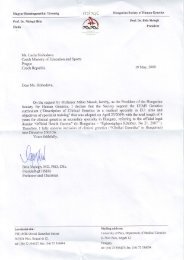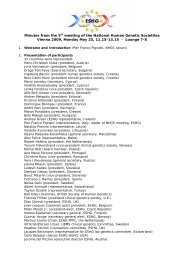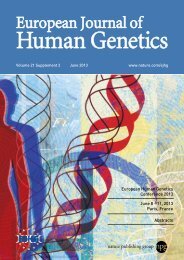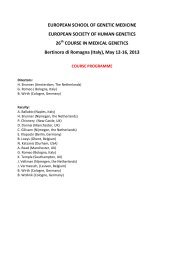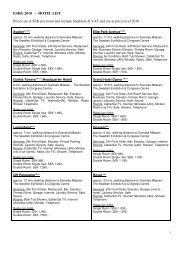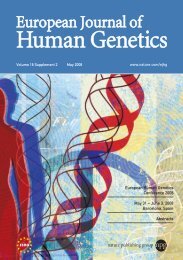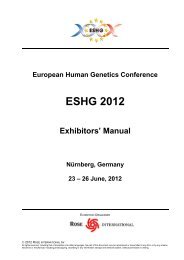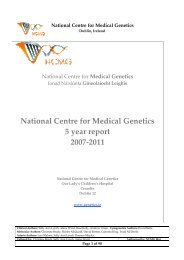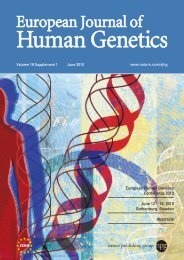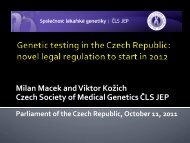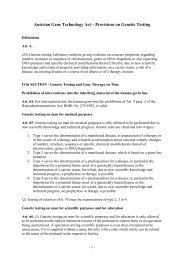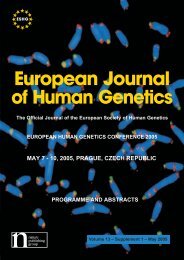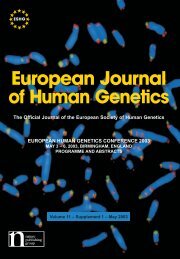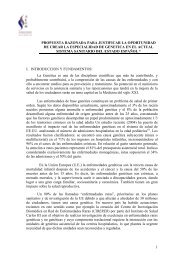2009 Vienna - European Society of Human Genetics
2009 Vienna - European Society of Human Genetics
2009 Vienna - European Society of Human Genetics
Create successful ePaper yourself
Turn your PDF publications into a flip-book with our unique Google optimized e-Paper software.
Cancer genetics<br />
licular thyroid cancer (80-90%), which belong to group <strong>of</strong> tumors well<br />
prognoses and slowly progress and benignity. Very serious problem<br />
are recurrences and regional or remote metastasis. Progression from<br />
well differentiated thyroid cancer to malignant anaplastic carcinoma<br />
is possible also. In this focus, very important seems to be searching<br />
for molecular markers <strong>of</strong> disease course, good or poor prognosis and<br />
response on medical treatment as well. It is expected that polymorphisms<br />
research in genes demonstrating association with neoplastic<br />
diseases will be helpful in understanding <strong>of</strong> molecular mechanisms <strong>of</strong><br />
thyroid gland tumors development. The dependence <strong>of</strong> differential thyroid<br />
cancer occurrence on DNA variation: I157T in CHEK2 gene, R72P<br />
in P53 gene, 1007fs in NOD2/CARD15 gene and synonymic G2497T<br />
substitution in RET protooncogene was examined. 296 patients with<br />
differentiated thyroid cancer and 200 individuals from population group<br />
was examined. We used pyrosequencing technique. There were no<br />
significant differences in allele or genotype frequencies in analysis <strong>of</strong><br />
RET G2497T substitution and R72P in P53 gene but mutated allele<br />
frequencies <strong>of</strong> 1007fs and I157T was 8,95% and 4,9% in patients with<br />
thyroid cancer, compared with 2,92% and 2,1% in control individuals<br />
respectively. Our findings indicates that particular characteristics <strong>of</strong><br />
cancer risk genes on RNA level as well as DNA changes is necessary.<br />
Additionally a summary effect <strong>of</strong> different SNP changes as a cancer<br />
predisposing factor is possible, so further analysis will be performed.<br />
P06.032<br />
two cases <strong>of</strong> double heterozygotes in families with hereditary<br />
cancer<br />
L. Foretova1 , M. Lukesova1 , J. Hazova1 , M. Navratilova1 , P. Plevova2 , E. Machackova1<br />
;<br />
1 2 Masaryk Memorial Cancer Institute, Brno, Czech Republic, University Hospital,<br />
Ostrava, Czech Republic.<br />
BRCA1 and BRCA2 genes are tested in all familial or sporadic early<br />
onset breast and ovarian cases, which fulfil inclusion criteria. Two <strong>of</strong><br />
the CHEK2 gene mutations, c.1100delC and deletion <strong>of</strong> exon 9-10,<br />
are also tested as a last step <strong>of</strong> examination, in all BRCA1/2 negative<br />
probands. MLH1, MSH2 and MSH6 genes are tested in cases <strong>of</strong> possible<br />
HNPCC syndrome. In one <strong>of</strong> our families both BRCA1 deletion<br />
<strong>of</strong> exon 20 and CHEK2 c.1100delC was detected in a proband with<br />
breast cancer at 44; her mother had breast cancer at 40 and ovarian<br />
cancer at 48. Proband has three daughters, one non-carrier, one carrier<br />
<strong>of</strong> CHEK2 mutation and one carrier <strong>of</strong> BRCA1 deletion. In other<br />
family originally tested for Lynch syndrome, MLH1 mutation (splice<br />
site) was detected in a proband with rectal cancer diagnosed at 58,<br />
whose father and grandfather had stomach cancer. Because his sister<br />
had breast cancer and mother had ovarian cancer, additional testing<br />
was provided and a BRCA1 mutation (protein truncating) was discovered.<br />
The occurrence <strong>of</strong> double heterozygotes is possible but probably<br />
rare. The clinical geneticist should carefully evaluate family history and<br />
indicate testing <strong>of</strong> additional hereditary cancer syndromes especially<br />
in probands with positive cancer occurrence from both parents. The<br />
preventive recommendations should be explained even in non-carriers<br />
<strong>of</strong> high-risk familial mutation. Supported by the Ministry <strong>of</strong> Health <strong>of</strong> the<br />
Czech Republic: Grant MZ0MZO2005<br />
P06.033<br />
Novel variants <strong>of</strong> fusion gene transcripts in s<strong>of</strong>t-tissue<br />
sarcomas.<br />
T. V. Kekeeva1,2 , A. A. Ryazantseva1 , L. E. Zavalishina1 , Y. Y. Andreeva1 , G. A.<br />
Frank1 ;<br />
1Herzen Moscow Oncological Research Institute, Moscow, Russian Federation,<br />
2Sechenov Moscow medical academy, Moscow, Russian Federation.<br />
S<strong>of</strong>t-tissue sarcomas have specific recurrent chromosomal translocations<br />
producing chimeric gene fusions, which regarded as a major<br />
factor in the development <strong>of</strong> these tumors. Fusion <strong>of</strong> FUS and CHOP<br />
gene is a common genetic event found in liposarcomas. Majority <strong>of</strong><br />
Ewing’s sarcomas are associated with fusion gene EWS-FIi1. These<br />
specific translocations can be used for exact diagnosis in poorly differentiated<br />
tumors.<br />
We examined 28 formalin-fixed paraffin-embedded sarcoma samples<br />
(20 liposarcomas, 8 Ewing’s tumors). Translocations were tested by<br />
FISH, characterization <strong>of</strong> fusion genes FUS/CHOP, EWS/FLI1 was<br />
performed by RT-PCR and sequencing.<br />
We observed translocations in 18/20 cases <strong>of</strong> liposarcomas and in<br />
8/9 cases <strong>of</strong> Ewing’s tumors. In 19/25 cases endogenous control B2M<br />
indicated adequate RNA quality. We found EWS/FLI1 fusion genes in<br />
3/8 Ewing’s sarcomas. In 2 cases ews exon 7 being fused to fli1 exon<br />
6, in 1 case ews exon 7 being juxtaposed to 10 ews exon following by<br />
fli1 exon 6 (novel fusion variant).<br />
We detected FUS/CHOP fusion gene in 45% (5/11). All cases had a<br />
type fusion transcript involving fusion <strong>of</strong> FUS exon 5 with CHOP exon<br />
2. Two novel transcript modifications were found, <strong>of</strong> which one had 6<br />
nucleotides insertion and the other lacked 14 nucleotides <strong>of</strong> CHOP.<br />
Moreover we found two different variants <strong>of</strong> the transcript in one sample,<br />
caused by alternative splicing apparently.<br />
Further investigation <strong>of</strong> structural attributes <strong>of</strong> fusion genes may be<br />
helpful for the prospective target therapy <strong>of</strong> patients with such fusion<br />
oncogenes and give insight into the malignant sarcoma development.<br />
P06.034<br />
Different genetic reasons <strong>of</strong> gastric cancer<br />
A. Tsukanov1 , A. Loginova1 , N. I. Pospekhova1 , T. A. Muzaffarova1 , L. N. Lubchenko2<br />
, M. P. Nikulin2 , E. K. Ginter1 , A. V. Karpukhin1 ;<br />
1 2 Research Centre For Medical <strong>Genetics</strong>, Moscow, Russian Federation, Cancer<br />
Research Centre, Moscow, Russian Federation.<br />
Mutations <strong>of</strong> CDH1 gene are associated with familial diffuse gastric<br />
cancer in some populations. MLH1 and MSH2 mutations also may predispose<br />
to gastric cancer.<br />
Three samples <strong>of</strong> patients for mutations and SNPs in the CDH1, MLH1<br />
and MSH2 genes were studied: 30 patients with familial gastric cancer,<br />
99 patients with sporadic gastric cancer and a control sample <strong>of</strong> 112<br />
probands by SSCP and sequencing.<br />
Mutations in gene CDH1 have not been found. We investigated our<br />
sample <strong>of</strong> familial gastric cancer and found 5 germline MLH1 and<br />
MSH2 mutations (16,6%). We have studied the significance <strong>of</strong> the<br />
CDH1 -160C/A variant in a promoter region for familial and sporadic<br />
forms <strong>of</strong> gastric cancer. The association <strong>of</strong> homozygote variant -160A/<br />
A with gastric cancer was shown for patients as with familial (OR=12,3;<br />
p=0,03) so sporadic form (OR=8,4; p=0,02). In addition it has been<br />
shown that the genotype 2076TT is associated with risk <strong>of</strong> a gastric<br />
cancer in a presence <strong>of</strong> a genotype -160CA for sporadic (OR=9,8;<br />
p=0,002) and the familial form (OR=12,3, p=0,009) but does not lead<br />
to the risk increasing in a presence <strong>of</strong> -160CC genotype. It is interesting<br />
that -160AC/2076TT genotype have not been found among 112<br />
healthy controls.<br />
In summary, mutations increasing cancer risk have been shown<br />
more frequent in MLH1 and MSH2 genes than CDH1. The genotype<br />
-160AC/2076TT <strong>of</strong> CDH1 has been certain for the first time as a risk<br />
genotype <strong>of</strong> gastric cancer.<br />
P06.035<br />
cDH1-160 polymorphism in Gastric cancer; could be an<br />
informative marker?<br />
A. Falahati 1 , M. Khoshsoror 1 , M. Karimpour 2 , Z. Soltani 2 , F. Jokar 1 , M. Jamali 1 ,<br />
R. Shahrokhi Rad 1 , F. Rezaei 1 , M. Fallah 1,3 , F. Mansour-Ghanaei 1 , A. Ebrahimi 3 ;<br />
1 Gastrointestinal and Liver Diseases Research Center, Guilan University <strong>of</strong><br />
Medical Sciences, Rasht, Islamic Republic <strong>of</strong> Iran, 2 Pasteure Institute, Tehran,<br />
Islamic Republic <strong>of</strong> Iran, 3 National Institute for Genetic Engineering and Biotechnology<br />
(NIGEB), Tehran, Islamic Republic <strong>of</strong> Iran.<br />
Introduction: Despite declining incidence rates, gastric cancer (GC) is<br />
a major cause <strong>of</strong> death worldwide and in Guilan Province, I.R. Iran.<br />
E-Cadherin is an adhesion molecule that is thought to be involved in<br />
gastric cancer patients. Polymorphism at position −160 C/A has been<br />
shown to affect GC risk in some studies.<br />
Material and methods: DNA was extracted from peripheral blood cells<br />
according to the protocols. E-Cadherin polymorphism at position -160<br />
C/A was investigated using PCR RFLP method.<br />
Result: Fifty-two cases (17 gastric cancer and 35 <strong>of</strong> their healthy 1st<br />
relatives) were included in the study. Allele Frequency was 90.4 % for<br />
C and 9.6 % for A. 84.6 % <strong>of</strong> cases were Homozygote (CC in 43 cases<br />
and AA in 1 case) and 15.4 % were Heterozygotes (C/A in 8 cases).<br />
A>C polymorphism was seen in 17.3 % <strong>of</strong> cases (in homozygote or<br />
heterozygote state). This have seen in 23.5 % <strong>of</strong> those with gastric<br />
cancer and in 14.3 %.<strong>of</strong> healthy one with gastric cancer in their 1 st<br />
relatives<br />
Conclusion: Polymorphisms in CDH1 have inconsistent relation<br />
with gastric cancer studies. In the present study, the CDH1−160C/A



